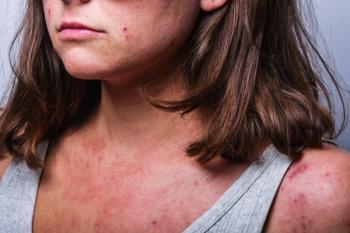
FDA approves guselkumab for children with plaque psoriasis and psoriatic arthritis
FDA approves guselkumab as the first IL-23 inhibitor for children 6 years or older with plaque psoriasis or psoriatic arthritis.
The FDA has approved guselkumab (Tremfya; Johnson & Johnson) for the treatment of children 6 years or older with a weight of at least 40 kg with moderate to severe plaque psoriasis (PsO) or active psoriatic arthritis (PsA). Eligible patients include those who are candidates for systemic therapy or phototherapy. Guselkumab is now the first and only IL-23 inhibitor approved for these pediatric indications.1
Guselkumab is a fully human, dual-acting monoclonal antibody that blocks IL-23 and binds to CD64, a receptor on cells that produce IL-23. IL-23 is a cytokine secreted by activated monocytes and dendritic cells and plays a key role in immune-mediated diseases, including PsO, PsA, ulcerative colitis, and Crohn disease.
This approval extends the drug’s use beyond its previous indications in adults with moderate to severe plaque PsO, approved in 2017, and active PsA, approved in 2020. Johnson & Johnson noted that the new approvals provide treatment options for approximately 20,000 children younger than 10 years diagnosed with plaque PsO each year and the estimated 14,000 children affected by PsA.1
Plaque psoriasis is a chronic immune-mediated disease that often begins in childhood. The inflamed, scaly plaques can be painful, itchy, and distressing, with the potential for long-term physical and psychological impact. Active PsA, which accounts for approximately 5% of the juvenile idiopathic arthritis population, is characterized by joint inflammation, swelling, and skin involvement and may affect a child’s physical ability and quality of life.
“Despite advancements in the treatment of pediatric plaque psoriasis and active psoriatic arthritis, there continues to be a significant gap in available therapies for these debilitating immune-mediated diseases that impact a child's physical and emotional well-being during critical years,” said Vimal Hasmukh Prajapati, MD, clinical associate professor at the University of Calgary and study investigator. “The approval of Tremfya offers physicians as well as parents and care partners an established treatment option with proven safety and demonstrated efficacy that can significantly improve the signs and symptoms in children living with these diseases.”
The plaque PsO approval was based on results from the phase 3 PROTOSTAR study, a randomized, placebo- and active comparator–controlled trial in pediatric patients. Coprimary end points of Psoriasis Area Severity Index of 90% or greater improvement (PASI 90) and Investigator Global Assessment (IGA) score of 0/1 were achieved at week 16.2
Approximately 56% of patients receiving guselkumab achieved PASI 90 compared with 16% of patients receiving placebo (P < .01). At week 16, 66% of guselkumab-treated patients achieved an IGA score of 0/1 compared with 16% on placebo (P < .001). Complete clearance (IGA 0) was observed in nearly 40% of guselkumab-treated patients compared with 4% on placebo (P < .01).
Approval for pediatric PsA was supported by pharmacokinetic extrapolation analyses of data from guselkumab studies in adults with PsO and PsA as well as pediatric patients with plaque PsO, including PROTOSTAR, VOYAGE 1 and VOYAGE 2, and DISCOVER-1 and DISCOVER-2.
“Every child deserves to feel comfortable in their own skin and to be active without the limitations of joint pain, stiffness, and swelling,” said Brandee Pappalardo, PhD, MPH, vice president of medical affairs in dermatology and rheumatology at Johnson & Johnson Innovative Medicine. “The approval of the first and only pediatric indications for an IL-23 inhibitor marks an important step forward not only for children but also for the parents and care partners who support them every day.”
The recommended pediatric dosage is 100 mg administered subcutaneously at week 0, week 4, and every 8 weeks thereafter, delivered via a 1-mL prefilled syringe.
Leah M. Howard, JD, president and CEO of the National Psoriasis Foundation, emphasized the need for more treatment options. “The physical and emotional impact of psoriasis and psoriatic arthritis can have children sitting on the sidelines of life, not attending social events because they are embarrassed [by] their plaques or their joint pain is too intense,” she said. “The National Psoriasis Foundation welcomes any new treatment option that provides hope for relief from the pain, discomfort, and the emotional burden of these conditions.”
PROTOSTAR safety data through week 16 showed adverse events in 42% of guselkumab-treated patients vs 68% in the placebo group. Common adverse events in the treatment group included nasopharyngitis, upper respiratory tract infection, and COVID-19. No serious or opportunistic infections were reported.
Johnson & Johnson highlighted that the approval is part of a broader commitment to advancing therapies for chronic immune-mediated diseases, noting additional recent FDA approvals for guselkumab in adults with ulcerative colitis and Crohn disease as well as ongoing label expansion efforts.
References
- U.S. FDA approves TREMFYA (guselkumab) for the treatment of pediatric plaque psoriasis and active psoriatic arthritis, marking a first and only approval for an IL-23 inhibitor. Press release. Johnson & Johnson. September 29, 2025. Accessed September 29, 2025. https://www.jnj.com/media-center/press-releases/u-s-fda-approves-tremfya-guselkumab-for-the-treatment-of-pediatric-plaque-psoriasis-and-active-psoriatic-arthritis-marking-a-first-and-only-approval-for-an-il-23-inhibitor
- A study to evaluate the efficacy, safety, and pharmacokinetics of subcutaneously administered guselkumab for the treatment of chronic plaque psoriasis in pediatric participants (PROTOSTAR). ClinicalTrials.gov. Updated September 29, 2025. Accessed September 29, 2025. https://clinicaltrials.gov/study/NCT03451851?tab=results
Newsletter
Access practical, evidence-based guidance to support better care for our youngest patients. Join our email list for the latest clinical updates.






